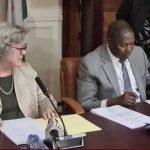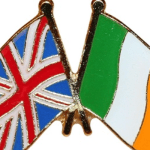Ireland has reached a deal to give back to Nigeria 5.5 million euros ($6.5 million) looted by former military dictator Sani Abacha, Nigeria’s justice minister said in a statement.
The money is the latest Abacha-linked cash reclaimed by Nigeria. Corruption watchdog Transparency International estimates that Abacha, who ruled Africa’s biggest oil producer from 1993 until his death in 1998, stole as much as $5 billion of public money during that time.
He was never charged with corruption in his lifetime.
“The return of these assets will be the first time that Ireland has taken such action and will be a concrete demonstration of Ireland’s commitment to international cooperation in the fight against corruption,” Helen McEntee, Ireland’s Minister for Justice and Equality, said in a statement.
Ireland froze the funds in October 2014 as part of an international operation that froze more than $1 billion worldwide, the statement said.
The agreement comes as Nigeria scrambles for cash to fill holes that have opened up in its budget as the coronavirus pandemic hammers oil prices.
In May, Nigeria received just over $300 million in Abacha funds from the United States and the British dependency of Jersey, despite concerns raised by a powerful U.S. senator that it could be misappropriated.
Ireland has reached a deal to give back to Nigeria 5.5 million euros ($6.5 million) looted by former military dictator Sani Abacha, Nigeria’s justice minister said in a statement.
The money is the latest Abacha-linked cash reclaimed by Nigeria. Corruption watchdog Transparency International estimates that Abacha, who ruled Africa’s biggest oil producer from 1993 until his death in 1998, stole as much as $5 billion of public money during that time.
He was never charged with corruption in his lifetime.
“The return of these assets will be the first time that Ireland has taken such action and will be a concrete demonstration of Ireland’s commitment to international cooperation in the fight against corruption,” Helen McEntee, Ireland’s Minister for Justice and Equality, said in a statement.
Ireland froze the funds in October 2014 as part of an international operation that froze more than $1 billion worldwide, the statement said.
The agreement comes as Nigeria scrambles for cash to fill holes that have opened up in its budget as the coronavirus pandemic hammers oil prices.
In May, Nigeria received just over $300 million in Abacha funds from the United States and the British dependency of Jersey, despite concerns raised by a powerful U.S. senator that it could be misappropriated.
Ireland has reached a deal to give back to Nigeria 5.5 million euros ($6.5 million) looted by former military dictator Sani Abacha, Nigeria’s justice minister said in a statement.
The money is the latest Abacha-linked cash reclaimed by Nigeria. Corruption watchdog Transparency International estimates that Abacha, who ruled Africa’s biggest oil producer from 1993 until his death in 1998, stole as much as $5 billion of public money during that time.
He was never charged with corruption in his lifetime.
“The return of these assets will be the first time that Ireland has taken such action and will be a concrete demonstration of Ireland’s commitment to international cooperation in the fight against corruption,” Helen McEntee, Ireland’s Minister for Justice and Equality, said in a statement.
Ireland froze the funds in October 2014 as part of an international operation that froze more than $1 billion worldwide, the statement said.
The agreement comes as Nigeria scrambles for cash to fill holes that have opened up in its budget as the coronavirus pandemic hammers oil prices.
In May, Nigeria received just over $300 million in Abacha funds from the United States and the British dependency of Jersey, despite concerns raised by a powerful U.S. senator that it could be misappropriated.
Ireland has reached a deal to give back to Nigeria 5.5 million euros ($6.5 million) looted by former military dictator Sani Abacha, Nigeria’s justice minister said in a statement.
The money is the latest Abacha-linked cash reclaimed by Nigeria. Corruption watchdog Transparency International estimates that Abacha, who ruled Africa’s biggest oil producer from 1993 until his death in 1998, stole as much as $5 billion of public money during that time.
He was never charged with corruption in his lifetime.
“The return of these assets will be the first time that Ireland has taken such action and will be a concrete demonstration of Ireland’s commitment to international cooperation in the fight against corruption,” Helen McEntee, Ireland’s Minister for Justice and Equality, said in a statement.
Ireland froze the funds in October 2014 as part of an international operation that froze more than $1 billion worldwide, the statement said.
The agreement comes as Nigeria scrambles for cash to fill holes that have opened up in its budget as the coronavirus pandemic hammers oil prices.
In May, Nigeria received just over $300 million in Abacha funds from the United States and the British dependency of Jersey, despite concerns raised by a powerful U.S. senator that it could be misappropriated.
Ireland has reached a deal to give back to Nigeria 5.5 million euros ($6.5 million) looted by former military dictator Sani Abacha, Nigeria’s justice minister said in a statement.
The money is the latest Abacha-linked cash reclaimed by Nigeria. Corruption watchdog Transparency International estimates that Abacha, who ruled Africa’s biggest oil producer from 1993 until his death in 1998, stole as much as $5 billion of public money during that time.
He was never charged with corruption in his lifetime.
“The return of these assets will be the first time that Ireland has taken such action and will be a concrete demonstration of Ireland’s commitment to international cooperation in the fight against corruption,” Helen McEntee, Ireland’s Minister for Justice and Equality, said in a statement.
Ireland froze the funds in October 2014 as part of an international operation that froze more than $1 billion worldwide, the statement said.
The agreement comes as Nigeria scrambles for cash to fill holes that have opened up in its budget as the coronavirus pandemic hammers oil prices.
In May, Nigeria received just over $300 million in Abacha funds from the United States and the British dependency of Jersey, despite concerns raised by a powerful U.S. senator that it could be misappropriated.
Ireland has reached a deal to give back to Nigeria 5.5 million euros ($6.5 million) looted by former military dictator Sani Abacha, Nigeria’s justice minister said in a statement.
The money is the latest Abacha-linked cash reclaimed by Nigeria. Corruption watchdog Transparency International estimates that Abacha, who ruled Africa’s biggest oil producer from 1993 until his death in 1998, stole as much as $5 billion of public money during that time.
He was never charged with corruption in his lifetime.
“The return of these assets will be the first time that Ireland has taken such action and will be a concrete demonstration of Ireland’s commitment to international cooperation in the fight against corruption,” Helen McEntee, Ireland’s Minister for Justice and Equality, said in a statement.
Ireland froze the funds in October 2014 as part of an international operation that froze more than $1 billion worldwide, the statement said.
The agreement comes as Nigeria scrambles for cash to fill holes that have opened up in its budget as the coronavirus pandemic hammers oil prices.
In May, Nigeria received just over $300 million in Abacha funds from the United States and the British dependency of Jersey, despite concerns raised by a powerful U.S. senator that it could be misappropriated.
Ireland has reached a deal to give back to Nigeria 5.5 million euros ($6.5 million) looted by former military dictator Sani Abacha, Nigeria’s justice minister said in a statement.
The money is the latest Abacha-linked cash reclaimed by Nigeria. Corruption watchdog Transparency International estimates that Abacha, who ruled Africa’s biggest oil producer from 1993 until his death in 1998, stole as much as $5 billion of public money during that time.
He was never charged with corruption in his lifetime.
“The return of these assets will be the first time that Ireland has taken such action and will be a concrete demonstration of Ireland’s commitment to international cooperation in the fight against corruption,” Helen McEntee, Ireland’s Minister for Justice and Equality, said in a statement.
Ireland froze the funds in October 2014 as part of an international operation that froze more than $1 billion worldwide, the statement said.
The agreement comes as Nigeria scrambles for cash to fill holes that have opened up in its budget as the coronavirus pandemic hammers oil prices.
In May, Nigeria received just over $300 million in Abacha funds from the United States and the British dependency of Jersey, despite concerns raised by a powerful U.S. senator that it could be misappropriated.
Ireland has reached a deal to give back to Nigeria 5.5 million euros ($6.5 million) looted by former military dictator Sani Abacha, Nigeria’s justice minister said in a statement.
The money is the latest Abacha-linked cash reclaimed by Nigeria. Corruption watchdog Transparency International estimates that Abacha, who ruled Africa’s biggest oil producer from 1993 until his death in 1998, stole as much as $5 billion of public money during that time.
He was never charged with corruption in his lifetime.
“The return of these assets will be the first time that Ireland has taken such action and will be a concrete demonstration of Ireland’s commitment to international cooperation in the fight against corruption,” Helen McEntee, Ireland’s Minister for Justice and Equality, said in a statement.
Ireland froze the funds in October 2014 as part of an international operation that froze more than $1 billion worldwide, the statement said.
The agreement comes as Nigeria scrambles for cash to fill holes that have opened up in its budget as the coronavirus pandemic hammers oil prices.
In May, Nigeria received just over $300 million in Abacha funds from the United States and the British dependency of Jersey, despite concerns raised by a powerful U.S. senator that it could be misappropriated.














